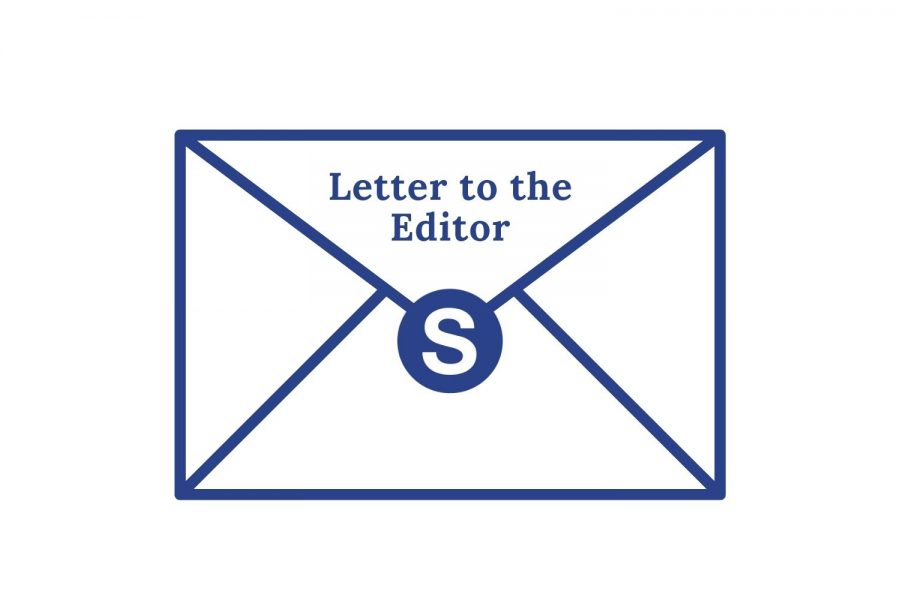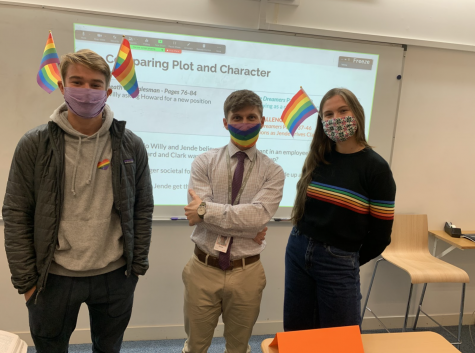To the Editor,
I would like to preface this letter by acknowledging the melodramatic nature of its driving impetus. Two lines of quotation in an interview for an impromptu news report hardly warrant the following 1,000 words in response. That being said, I have decided nonetheless to address my commentary in the Oct. 26 article headlined “GSA silent protest, Trump-Pence campaign flag provoke debate among student body” mainly because it presents itself as a great opportunity to stimulate some seldom-had nuanced discourse and to clarify, for the benefit of this predominantly liberal/leftist community, the key facets of a conservative moderate’s viewpoints regarding the issue of modern civil rights and free speech.
First and foremost, I wholeheartedly endorse and encourage political expression and peaceful protest, which the silent protest ostensibly falls under. Although I thought this was evident in my initial quote, asserting my belief in the duty of educators at an American School to uphold American doctrine, it was clearly misunderstood by the writership and, thus, the community. One of the greatest foundational doctrines in the history of the social contract is the United States Constitution, and, most pertinently, the First Amendment. The U.S. is unique in that its free speech doctrine, codified in the First Amendment, is predicated on unadulterated free expression*. It is, as famously characterized by Justice Oliver Wendall Holmes, a “free trade in ideas” wherein lies “competition of the market” (Abrams v. United States). This is to say that American political theory is based on the notion that discussion and collective evaluation of ideas is the most optimal way to improve our collective values and to adequately determine the morality or practicality of relevant ideas. As a constitutional conservative, I believe there to be no more valuable a mechanism than this. I also believe that the GSA’s decision to engage in silent protest was a fulfillment of this mechanism, one which should always be encouraged and lauded within our community.
Toward the end of the article, I was contextualized as having criticized the GSA for a “superficial” display of support for members of the LGBTQIA+ community. In my observation of the response to the article, this appeared to be the most controversially received component of my contribution, and, understandably so. However, I would like to clarify, beyond a shadow of a doubt, that this was a misappropriation of the meaning of my words and a disregard for the entire context surrounding them. I was quoted as having said, with regards to the silent protest, “It’s somewhat ironic considering the debates on the left about performative allyship.” At this particular point in the interview, I was considering how the protest’s focus on physical symbolism would be received by members of the progressive left rather than stating my personal belief in the concept of “performative allyship.” One of my greatest ongoing criticisms of the doctrine of the progressive movement is that it is in perpetual disagreement with itself on the nature of effective protest. I’m always coming across Instagram posts referring to the “performative” nature of physically displaying one’s support for a movement. It’s what the modern conservative think-tanks would refer to as “virtue signalling,” ostentatiously displaying support for a movement primarily for the benefit to one’s social reception. As a moderate conservative, I am very much on the fence about the issue of “performative allyship” as it relates to matters of physical symbolism. I, in contrast to critics of “performative” activism, believe imagery can be very powerful as a mechanism of social change, and am not wholly convinced that it is merely just cursory support. From the iconic sashes of the Edwardian Suffrage movement to Gerald Holtom’s “peace symbol” ubiquitously associated with the antiwar period during the ’60s, symbolism has the ability to stimulate collective resolve and encourage unity within a specific cause. The human psyche is profoundly influenced by the visual, there is plenty of psychological precedent to that end. My quote was not a statement of my belief that the GSA protest was paradigmatic of “performative allyship,” rather a criticism of the members progressive left who would believe it to be; those who erroneously devalue the importance of symbolism within the realm of social activism. My quote was actually indirectly supporting the GSA’s choice to protest that which they believe to be inherently unjust by use of symbolism.
My commentary in the interview for the article in question was primarily a critique of ASL’s propensity toward selectively encouraging student expression whilst ostracizing those who express ideas which might be considered pervasive by the leftist majority. It is from this critique that the quote referring to “American doctrine” was taken. Although in the interview I acknowledged that, as a private institution, the American School in London does not have an obligation to uphold political impartiality and, thus, promulgating a left-leaning socio-political agenda is their prerogative, I believe it is nonetheless reprehensible to engage in mindless politics at school without being honest about its true nature. Many students are so blinded by an unremitting certainty as to the truth of their viewpoints, that they believe their political contentions are nothing less than objective. This is why we see the common debate-ending trope “it’s not political, it’s just a matter of human rights.” Many members of the community, and indeed the populist left, have fallen victim to such a conceited state of certainty that they truly believe “gott mit uns” – that their opinions on economic or social issues are not open to debate because they are the exclusive products of objective moral reason. I firmly believe that this is because ASL has successfully distorted the lines between objectivity and opinionated contentions such that they hold the two as tantamount. The assertion made in my first quoted section, in its relevant context, was that ASL should either entirely forego political discussion in the curriculum or alternatively, and more desirably, continue with practical political discussion whilst clarifying the difference between stipulations/facts and opinions. Teachers, before imparting their political views in a social studies or English class should clarify, for the sake of upholding their socratic duty towards neutrality, that “this is an opinion” rather than simply insinuating it to be the objective truth. Though I expect this criticism to “fall on deaf ears” at an institution with minute amounts of political dissent, it was nonetheless the point of my initial quote and one I tried to express for the majority of the interview.
In summation, it is perhaps due to an issue with the precision of my language that I find myself writing hundreds of words clarifying my positions. For this I apologize, and resolve to be more introspective in my word choice and more considerate of how the manner in which I formulate speech may potentially impact those around me regardless of intended meaning. That being said, I stand by my clarified assertions regarding the nature of ASL’s political topography and firmly hope we are able to rectify this dangerous ideological homogeneity in order that we might ultimately become better thinkers and more effective communicators, not just at ASL but in the world beyond.
Semper veritati inservit,
Connor Eaton







